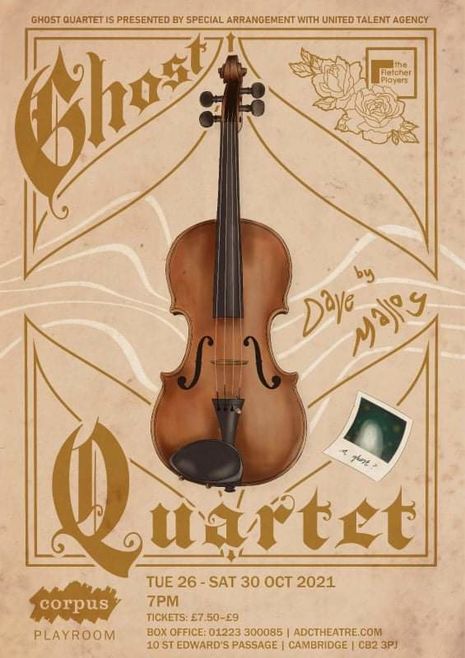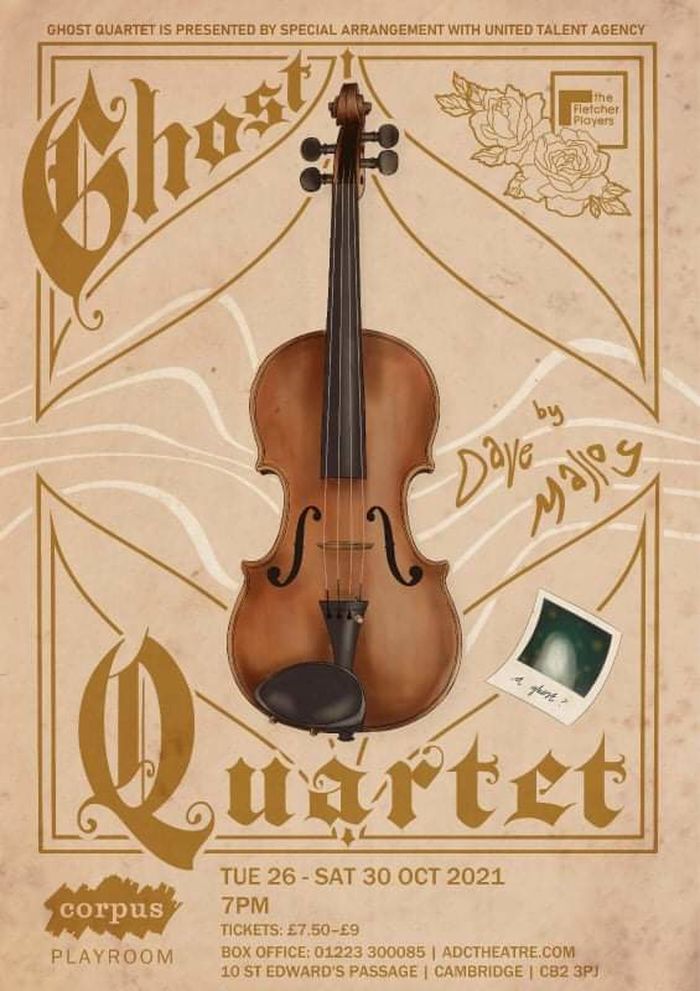Ghost Quartet: Musical theatre with an impressive emotional range
Theatre Editor Stanley Lawson reviews this weeks Corpus Mainshow, Dave Malloy’s Ghost Quartet

Ghost Quartet successfully conjures an eery space which defies temporality, occasionally located in modernity while the set lent credence to the 18th-century American Gothic energy of much of the drama in the songs of the cycle. Dark patterned wallpaper, cut glass whiskey tumblers and the Ushers – the comparisons to Edgar Allen Poe come naturally but Ghost Quartet was self-aware enough to escape the trap of maudlin horror, counterpointing its emotional weight with light-hearted knowing gags to the audience. Indeed, some of Ghost Quartet’s most innovative and original moments are in its stepping back from the story and the form of a musical/dramatic song cycle to jest with the audience, or even include them in the music.
“Excellent chemistry between Grace and Smith fizzing on stage”
Each performer held their own with the others on stage individually; no one voice felt too drowned out, neither was there a voice which blasted over the others. However, their strengths came out especially in the solo numbers, one of Tom Hayes’ being a lively closer to ‘Side 1’ and Emilia Grace’s powerful voice flourished in her solo numbers. Gregory Miller was smooth and at ease as compere and a continuity voice, while Maddie Smith sustained the feeling of her individual parts wonderfully consistently through several challenging numbers, often carrying the weight of the drama. Although they performed well as a quartet, with particularly excellent chemistry between Grace and Smith fizzing on stage, their musical gelling together as a group didn’t feel quite as easy as their individual performances. The strength of the music also worked to compensate for the few scenes without any music, performed as ‘straight’ theatre, in which the dialogue struggled to match the pace of the rest of the show – fortunately most of these scenes also involved a monologue from Smith, who more than rescued the energy of these scenes with brilliantly delivered, expletive-laden punch.
In the writing of Ghost Quartet, Dave Malloy seemingly banked on an old tradition, that the strength of a piece of musical theatre, in the broadest possible sense, needs drama more than it needs plot. From this idea follow jukebox musicals – some good, some questionable – and musicals without narrative (35mm, for example). This largely paid off under Lily Blundell and Hayley Canham’s direction, the well crafted but not over-worked emotional range of the piece pulling it through the sometimes incomprehensible plot. However, there were some directorial oversights that clashed with emotional charge being reached for in each song sequence. These were mostly moments where it was not entirely clear if a performer had changed character, and other moments where one felt as though a change of character was being indicated – in the appearance of a fez upon Hayes’ head, for example – but it felt like the changes were not always followed through in the direction of a particular sequence.
Blundell herself sat throughout at the piano in the centre stage like an ivory-tinkling ringmaster and, with cellist Elizabeth Vogel, accompanied the quartet with great style. They did not falter, pushing along the performers through some first night foibles, keeping pace even in the face of a few forgotten lines or difficulty with the set, the kind of things that are almost always ironed out as a run goes on. However, the minor technical and dramatic flaws of this production were not enough to prevent this critic from having an enormously fun time yesterday evening – by the final number the quartet and Blundell even had me clapping along with the rest of the audience. As an experience of a fun, energising, unpretentiously form-breaking piece of theatre, in which one can’t help but clap along, Ghost Quartet is well worth the price of a Corpus ticket.
 News / Uni Scout and Guide Club affirms trans inclusion 12 December 2025
News / Uni Scout and Guide Club affirms trans inclusion 12 December 2025 News / Pembroke to convert listed office building into accom9 December 2025
News / Pembroke to convert listed office building into accom9 December 2025 Features / Searching for community in queer Cambridge10 December 2025
Features / Searching for community in queer Cambridge10 December 2025 News / Uni redundancy consultation ‘falls short of legal duties’, unions say6 December 2025
News / Uni redundancy consultation ‘falls short of legal duties’, unions say6 December 2025 News / Gov declares £31m bus investment for Cambridge8 December 2025
News / Gov declares £31m bus investment for Cambridge8 December 2025









